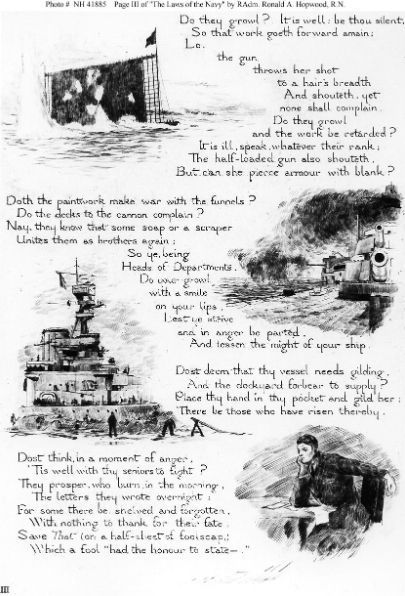Name/Title
The Laws of the Navy [Plate III]Description
The Laws of the Navy Plate III (of four) of an edition of the poem of cautionary tales and fatherly advice:
"Do they growl? It is well: be thou silent,
So that work goeth forward amain;
Lo, the gun throw her shot to a hair's breath
And shouteth, yet none shall complain.
Do they growl and the work be retarded?
It is ill, speak, whatever their rank;
The half-loaded gun also shouteth,
But can she pierce armor with blanks?
Doth the paintwork make war with the funnels?
Do the decks to the cannon complain?
Nay, they know that some soap or a scraper
Unites them as brothers again.
So ye, being Heads of Departments,
Do your growl with a smile on your lips,
Lest ye strive and in anger be parted,
And lessen the might of your ships.
Dost deem that thy vessel needs gilding,
And the dockyard forbear to supply?
Place thy hand in thy pocket and gild her;
There be those who have risen thereby.
Dost think, in a moment of anger,
'Tis well with thy seniors to fight?
They prosper, who burn in the morning,
The letters they wrote overnight;
For some there be, shelved and forgotten,
With nothing to thank for their fate,
Save "That" (on a half-sheet of foolscap),
Which a fool "had the honour to state—."Context
The July 23, 1896 issue of the British "Army and Navy Gazette" presented a poem that was destined to become one of the Naval World's literary classics. Written by Royal Navy Rear Admiral Ronald A. Hopwood, this work, entitled "The Laws of the Navy", set forth what might safely be termed the "wisdom of the ages" for all who seek to make their way in large, hierarchical organizations, with special emphasis on the seagoing versions. During the World War I era Lieutenant Rowland Langmaid, R.N., made a series of etchings to accompany the poem, which was published in the version presented here.
By the mid-1920s, the virtues of "The Laws of the Navy" having crossed from the "Red" side of the broad Atlantic and penetrated the consciousness of the "Blue" side, the poem began to appear in the U.S. Naval Academy's "Reef Points", a little handbook presented to Plebes ("Freshmen" to those unversed in things U.S. Navy) for their edification and guidance. It has been featured in the annual editions of this publication up to the present day, and many a hoary former Plebe can recite its words by heart, having been made to memorize them as an essential part of the educational process.
Starting in the early 1970s, "Reef Points" provided a brief introduction to "The Laws of the Navy", which is quoted here (as printed in the 1998-1999 edition) for the benefit of All Hands:
"As a word of advice, we include 'The Laws of the Navy' by Admiral R.A. Hopwood, R.N.(ret.). These twenty-seven laws contain words of wisdom that few of you will appreciate fully now, words which you may wish you had heeded twenty years from now. Read these laws, then apply them. See how those above you apply these rules--and how they sometimes disregard them--and the consequences. Be alert to learn from others; only through experience will your understanding of others broaden. You will become a richer and fuller person, a better naval officer."
